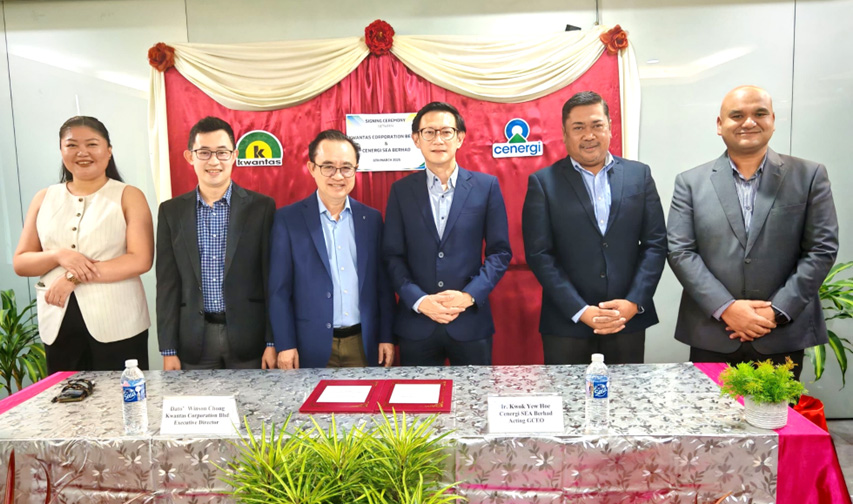CENERGI AND KWANTAS JOINTLY DEVELOP ITS FIRST BIO-CNG PLANT IN LAHAD DATU, SABAH
Kota Kinabalu, 6 March 2025 - Cenergi SEA Berhad (Cenergi), a subsidiary of UEM Lestra Berhad, today signed a Build-Own-Operate (BOO) Agreement with Kwantas Corporation Berhad (Kwantas) for the development of its first Bio-Compressed Natural Gas (Bio-CNG) plant in Lahad Datu, Sabah.
This milestone follows the joint venture (JV) partnership established in 2024 between Cenergi and Kwantas, a Sabah-based integrated palm oil producer with operations across the entire palm oil supply chain, both locally and in China.
Under the BOO framework, the JV entity, Cenergi Kwantas Pintasan Sdn. Bhd., will develop the Bio-CNG plant on approximately 4.9 acres of land adjacent to Pintasan Palm Oil Mill, owned by Kwantas. The plant will process the Palm Oil Mill Effluent (POME) waste derived from the Palm Oil Mill, the Biogas captured will then be treated and purified into Biomethane and finally compressed into Bio-CNG for sale to off-takers as a clean and sustainable energy source.
Ir. Kwok Yew Hoe, Acting Group Chief Executive Officer of Cenergi SEA Berhad, emphasised the project’s strategic importance, stating, “This project represents a significant milestone for Cenergi as we expand our renewable energy footprint in Sabah. Through innovative technology, we are not only enhancing the treatment of palm oil waste to meet regulatory standards but also unlocking new value through sustainable energy production.”
He further added, “Our commitment to environmental stewardship is reflected in projects like this. By transforming POME into Bio-CNG, we are providing industries with a reliable, low-carbon fuel alternative while simultaneously reducing greenhouse gas emissions and supporting Malaysia’s net-zero ambitions.”
Dato’ Winson Chong, Executive Director of Kwantas Corporation Berhad, stated that, “The collaboration efforts between Kwantas and Cenergi to develop a Bio-CNG plant in Lahad Datu is expected to become a game-changer in the palm oil industry in Sabah, as clean and renewable energy can now be produced simultaneously with the production of crude palm oil and palm kernel. Other than complying with environmental regulations and emission standards by the Palm Oil Mill, such sustainable integrated processing activities shall pave way to green natural gas supply to meet the industrial energy demands in the East Coast region of Sabah.”
The development of this Bio-CNG plant directly supports Malaysia’s National Energy Transition Roadmap (NETR), accelerating the nation’s shift towards renewable energy while strengthening the circular economy through waste-to-energy- innovation.
 Kwantas and Cenergi at the signing event of BOO Agreement.
Back to Media Centre
Kwantas and Cenergi at the signing event of BOO Agreement.
Back to Media Centre